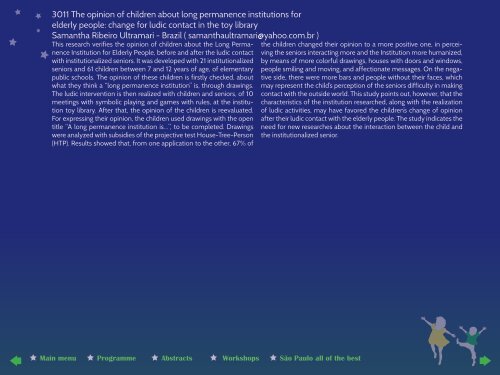Programa completo do Congresso - Associação Brasileira de ...
Programa completo do Congresso - Associação Brasileira de ...
Programa completo do Congresso - Associação Brasileira de ...
You also want an ePaper? Increase the reach of your titles
YUMPU automatically turns print PDFs into web optimized ePapers that Google loves.
3011 The opinion of children about long permanence institutions for<br />
el<strong>de</strong>rly people: change for ludic contact in the toy library<br />
Samantha Ribeiro Ultramari - Brazil ( samanthaultramari@yahoo.com.br )<br />
This research verifies the opinion of children about the Long Permanence<br />
Institution for El<strong>de</strong>rly People, before and after the ludic contact<br />
with institutionalized seniors. It was <strong>de</strong>veloped with 21 institutionalized<br />
seniors and 61 children between 7 and 12 years of age, of elementary<br />
public schools. The opinion of these children is firstly checked, about<br />
what they think a “long permanence institution” is, through drawings.<br />
The ludic intervention is then realized with children and seniors, of 10<br />
meetings with symbolic playing and games with rules, at the institution<br />
toy library. After that, the opinion of the children is reevaluated.<br />
For expressing their opinion, the children used drawings with the open<br />
title “A long permanence institution is…”, to be completed. Drawings<br />
were analyzed with subsidies of the projective test House-Tree-Person<br />
(HTP). Results showed that, from one application to the other, 67% of<br />
the children changed their opinion to a more positive one, in perceiving<br />
the seniors interacting more and the Institution more humanized,<br />
by means of more colorful drawings, houses with <strong>do</strong>ors and win<strong>do</strong>ws,<br />
people smiling and moving, and affectionate messages. On the negative<br />
si<strong>de</strong>, there were more bars and people without their faces, which<br />
may represent the child’s perception of the seniors difficulty in making<br />
contact with the outsi<strong>de</strong> world. This study points out, however, that the<br />
characteristics of the institution researched, along with the realization<br />
of ludic activities, may have favored the children’s change of opinion<br />
after their ludic contact with the el<strong>de</strong>rly people. The study indicates the<br />
need for new researches about the interaction between the child and<br />
the institutionalized senior.<br />
Main menu Programme Abstracts Workshops São Paulo all of the best


